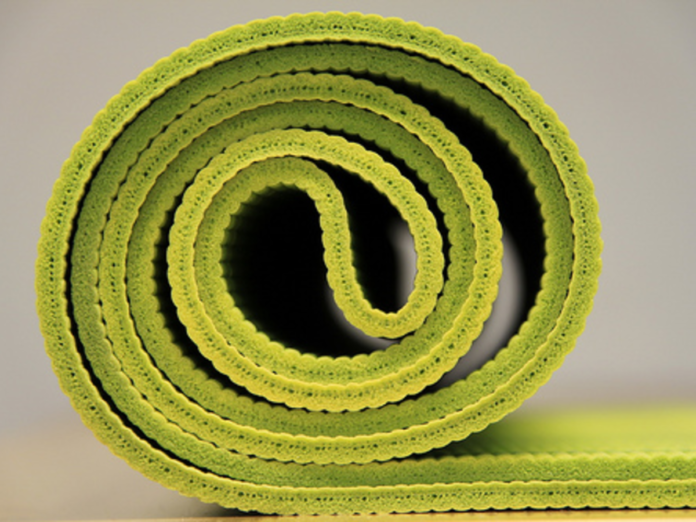As a college student in Texas, Stephon Bradberry tried yoga for the first time—a difficult hot yoga class taught by a friend. “I hated it,” he says. “I was the only Black person there, and looking back, I realized that was a huge part of it being disempowering.” Years later, when Bradberry moved to D.C. in 2019, he gave yoga another try at a class specifically for Black men.

“It was dope, but the teacher wasn’t a Black man,” he says. Bradberry saw an opportunity to create yoga spaces not only for Black men, but led by Black men.
Bradberry enrolled in yoga teacher training and in 2023 founded the Black Folx Wellness Collective with his friend Royce Sarpy. As a nonprofit, BFWC’s mission is to create wellness spaces for Black people that nurture and fortify the mental, physical, emotional, and spiritual needs of their community through events such as hiking, book clubs, and yoga classes. BFWC classes are open to anyone.
I became interested in yoga after being diagnosed with ADHD, anxiety, and depression. I wanted to find holistic ways to manage my stress levels and avoid burnout. Yoga became a part of my self-care routine.
After taking one of Bradberry’s weekend Freedom Flow classes at Union Market, I sat down with him to talk about how the Black community can benefit from yoga and the future of the BFWC.
This conversation has been edited for clarity and length.
Washington City Paper: Why do you think that Black folks, especially Black men, aren’t part of the greater yoga community?
Stephon Bradberry: I think we are, I’m just not sure that there have been real concerted efforts to shift this space to meet where people are at. I am not particularly sure—to be very clear—on what the actual answer is.
This collective is led by a queer Black person who doesn’t bend or bow or shake or break. I take up this space, and I’m inviting menfolk to do the same. So I think we’re in [the] community, but I don’t know if they’re really getting what they need.
WCP: What do you think needs to happen to make yoga more inclusive for Black men?
SB: I can tell you what I’m going to do. I am just going to continue to carve this space and to go where the people are. And do my best to make freedom irresistible. When our physical space opens—the only and the first yoga studio in Union Market—[it] will not be owned by some White lady.
[It’ll be owned by] a Black boy from Niagara Falls, New York, who grew up in Dallas, Texas, who has a fervent belief that all of us can be free. That entire place will be a physical manifestation of that. I know what people share when they leave these spaces—whether it’s me teaching or any of the teachers that I employ and give a platform to—they feel empowered, they feel fortified, they feel willing and able to tackle the world in front of them.
WCP: Do you feel that yoga is practiced and represented differently in the Black community here?
SB: I think it’s just like gumbo. We take everything and turn it into a new thing. When I’m teaching, I’m very huge on whatever space you meet me in, you get the same Stephon. I’ve taught in very White studios, and I’ve taught the same way and used the same music. Talk about stories the same way. Do my thing the same way and keep showing up.
I will say that when it is mostly Black people, there’s a different aura in the room; there’s a different shift. It’s the same feeling like when you get home after church on Sunday—at your home church after you’ve been around all your cousins and all your people. You’re kind of floating. You’re tired, but you’re floating. You feel invigorated to keep going forward.
We don’t have those types of spaces anymore that are not just church. And church life has gone through the shitter because of the phobias and isms and all the other stuff that we allow to happen in there. We don’t have third spaces anymore that you don’t have to pay $250 a month to be in. So that’s why a lot of us are walking around depleted. And with what we’re building, it will be a third space that just so happens to have a yoga studio. I am concerned about us [not] gathering, we have to gather to fortify each other.
WCP: How can Black men and the Black community benefit from yoga?
SB: It will transform our lives. It will shift the way we look at ourselves. It will shift the way we value ourselves and the way we value other people. It can, if we let it, shift the dynamic in the way we show up in the world. We may show up softer. Still sturdy, but soft. You can be sturdy as a brick house and never fall over, but you’re still soft. You still allow yourself to be felt. And that’s what I hope it does.
WCP: What are your hopes for the future of the Black Folx Wellness Collective?
SB: That we will be a global organization that trains, empowers, and resources people. We have about eight target cities and people in these cities that can launch chapters. Once the collective goes into those places, and then we’re really on the ground there, I envision us working with communities on the ground to build up these community centers there that just so happen to have yoga studios but meet the needs of that particular community. We have a central ethos and a politic of how we do and how we work. Yet it’s unique. Every single one is unique.

